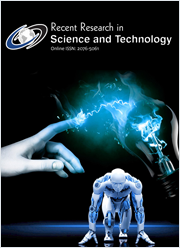I.C. Engine emissions with varied proportions of mixtures of petrol, diesel, bio-diesel and other organic fuels
Keywords:
I.C.Engine, petrol, dieselAbstract
The numbers of Internal Combustion engines are increasing day by day. The undesirable emissions generated in the combustion process in IC engine pollute the environment which contributes to global swarming, acid rain, smog, respiratory and other health problems. The major causes of these emissions are non-stoichiometric combustion, dissociation of Nitrogen, and impurities in the fuel and air. The emissions of major concern to health are hydrocarbons (HC), carbon monoxide (CO), Oxides of Nitrogen (NOx), Sulphur and solid carbon particulates. Ideally, engines and fuel systems could be developed in such a way that very few harmful emissions would be generated, and these could be exhausted to the surroundings without a major impact on the environment. With present technology this is not possible, and hence after-treatment of the exhaust gases to reduce emissions is very important. This consists mainly of the use of thermal or catalytic converters and particulate traps.




 .
.